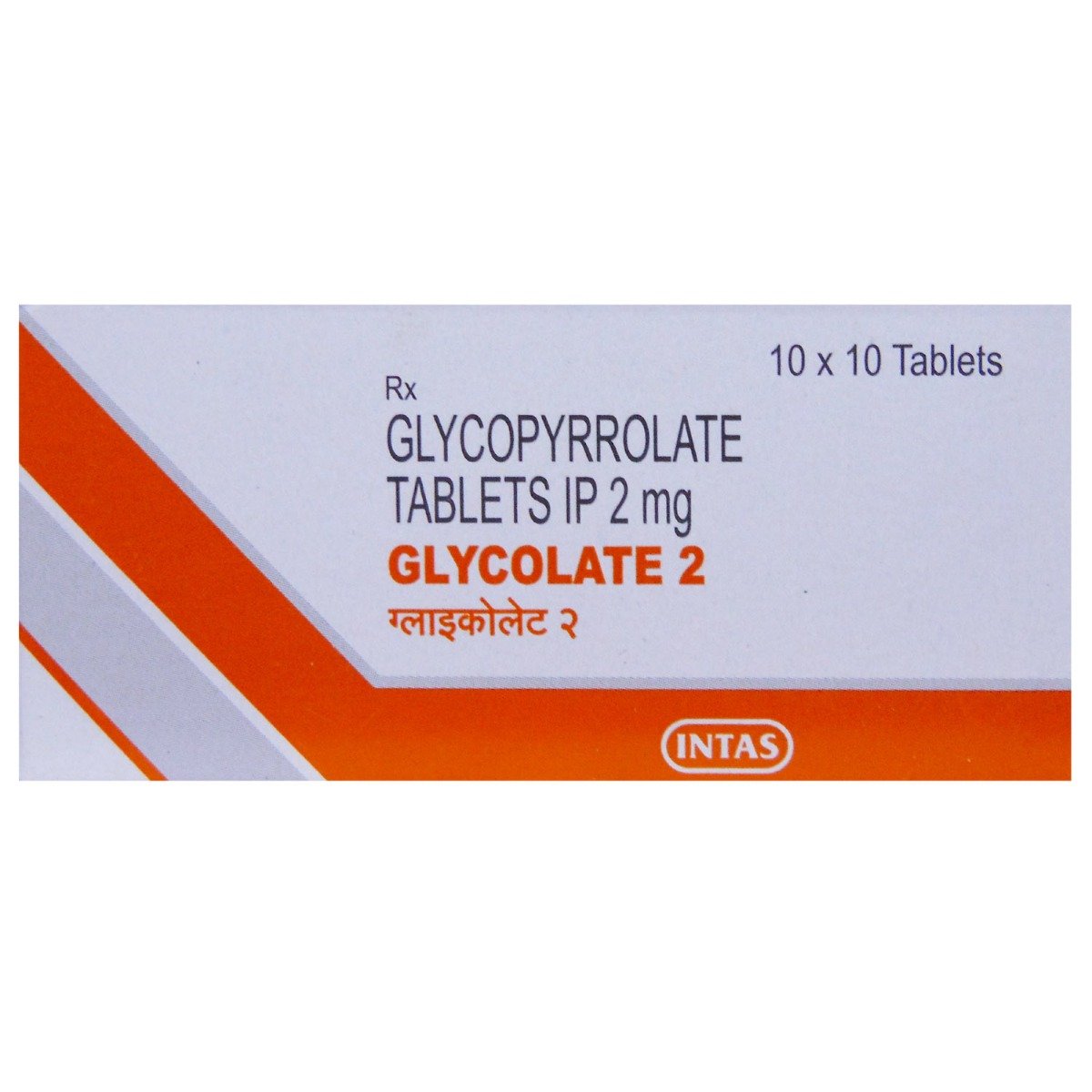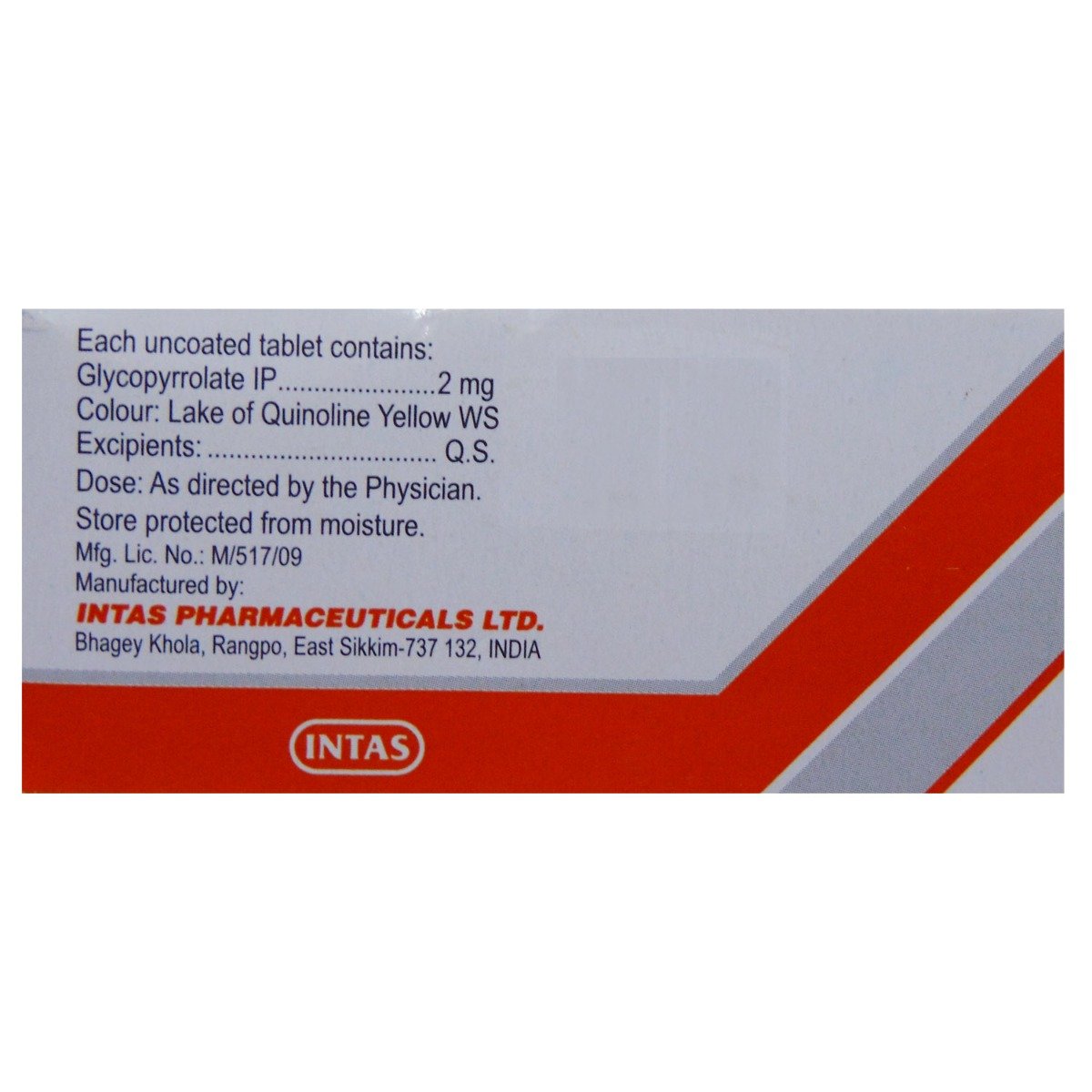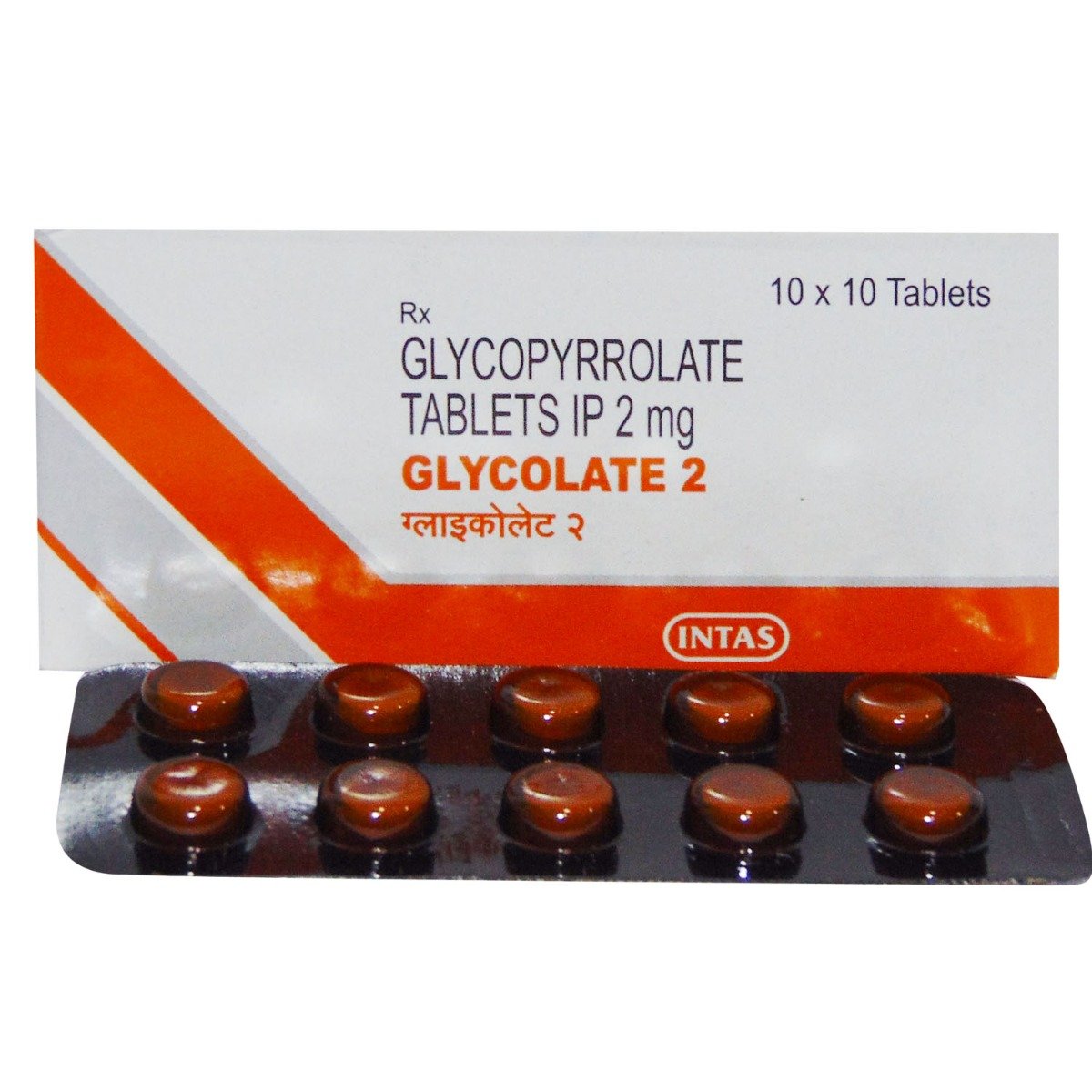Glycolate 2 Tablet 10's
MRP ₹218
(Inclusive of all Taxes)
₹32.7 Cashback (15%)
Provide Delivery Location
Online payment accepted
 Prescription drug
Prescription drugWhats That
 40 people bought
40 people bought Composition :
Manufacturer/Marketer :
Consume Type :
Expires on or after :
Return Policy :
About Glycolate 2 Tablet
Glycolate 2 Tablet belongs to the group of medications called ‘anticholinergics’ primarily used to treat peptic ulcers in adults and children above 12 years. It is also used to treat severe drooling caused by certain neurologic disorders (cerebral palsy) in children 3 to 16 years of age. Peptic ulcers are sores that develop on the lining of the stomach and intestine due to erosion of the stomach's protective lining.
Glycolate 2 Tablet contains ‘Glycopyrrolate’, which decreases stomach acid and saliva production by blocking the activity of a certain natural substance in the body. Thereby helps treat peptic ulcers and drooling.
You are advised to take Glycolate 2 Tablet for as long as your doctor has prescribed it for you, depending on your medical condition. In some cases, Glycolate 2 Tablet may cause dry mouth, vomiting, flushing, headache, and nasal congestion. Most of these side effects of Glycolate 2 Tablet do not require medical attention and gradually resolve over time. However, if the side effects persist or worsen, please consult your doctor.
Inform your doctor if you are allergic to any of the components in Glycolate 2 Tablet . Consult your doctor if you are pregnant or breastfeeding. Glycolate 2 Tablet may cause sleepiness and blurred vision, do not drive or operate machinery unless you are alert. Let your doctor know if you are taking any prescription and non-prescription medications, including vitamins and herbal supplements.
Uses of Glycolate 2 Tablet
Directions for Use
Key Benefits
Glycolate 2 Tablet belongs to the group of medications called ‘anticholinergics’ primarily used to treat peptic ulcers in adults and children above 12 years. It is also used to treat severe drooling caused by certain neurologic disorders (cerebral palsy) in children 3 to 16 years of age. Glycolate 2 Tablet contains ‘Glycopyrrolate’, which decreases stomach acid and saliva production by blocking the activity of a certain natural substance in the body. Thereby helps treat peptic ulcers and drooling.
Storage
- A blocked nose can be relieved by drinking more water, which helps clear fluids.
- Use saline nasal spray available over the counter to relieve blockage or blow harder to remove the mucus.
- Use nasal strips that can be placed on the nose to widen nostrils and increase airflow.
- Keep a humidifier around to moisten air at home/workplace.
- Consult your doctor if you experience skin redness, itching, or irritation after taking medication.
- Your doctor may adjust your treatment plan by changing your medication or providing guidance on managing your erythema symptoms.
- Your doctor may recommend or prescribe certain medications to help alleviate symptoms.
- Apply cool compresses or calamine lotion to the affected skin area to reduce redness and itching.
- Stay hydrated by drinking plenty of water to help alleviate symptoms and keep your skin hydrated.
- Monitor your skin condition closely and promptly report any changes, worsening symptoms, or concerns to your healthcare provider.
- Manage stress by practising deep breathing, yoga or meditation.
- Get enough sleep. Maintain a regular sleep cycle.
- Exercise regularly. Try physical activities like walking, running, or dancing.
- Limit stimulants like tea, coffee and alcohol.
- Identify triggers and try managing them.
- Take a break by scheduling time for yourself.
- Try creative activities like writing, dancing or painting as it helps release tension.
- Inform your doctor about your constipation symptoms. They may adjust your medication or advise alternative treatments.
- Stay hydrated by drinking sufficient of water (at least 8-10 glasses a day) to help soften stool and promote bowel movements.
- Increase fibre intake by eating foods high in fibre, such as fruits, whole grains, vegetables and legumes, to help bulk up the stool.
- Establish a bowel routine by trying to go to the bathroom at the same time each day to train your bowels.
- Engaging in regular exercise, like walking or yoga, can support in bowel movement stimulation.
- Consult your doctor if constipation persists, and discuss alternative treatments or adjustments to your medication.
- Inform your doctor about dry mouth symptoms. They may adjust your medication regimen or prescribe additional medications to manage symptoms.
- Drink plenty of water throughout the day to help keep your mouth moist and alleviate dry mouth symptoms.
- Chew sugar-free gum or candies to increase saliva production and keep your mouth moisturized.
- Use saliva substitutes, such as mouthwashes or sprays, only if your doctor advises them to help moisturize your mouth and alleviate dry mouth symptoms.
- Avoid consuming smoking, alcohol, spicy or acidic foods, and other irritants that may aggravate dry mouth symptoms.
- Schedule regular dental check-ups to keep track of your oral health and handle any dry mouth issues as they arise.
- Inform Your Doctor: Notify your doctor immediately about your diarrhoea symptoms. This allows them to adjust your medication or provide guidance on managing side effects.
- Stay Hydrated: Drink plenty of fluids to replace lost water and electrolytes. Choose water, clear broth, and electrolyte-rich drinks. Avoid carbonated or caffeinated beverages to effectively rehydrate your body.
- Follow a Bland Diet: Eat easy-to-digest foods to help firm up your stool and settle your stomach. Try incorporating bananas, rice, applesauce, toast, plain crackers, and boiled vegetables into your diet.
- Avoid Trigger Foods: Steer clear of foods that can worsen diarrhoea, such as spicy, fatty, or greasy foods, high-fibre foods, and dairy products (especially if you're lactose intolerant).
- Practice Good Hygiene: Maintain good hygiene to prevent the spread of infection. To stay healthy, wash your hands frequently, clean and disinfect surfaces regularly, and avoid exchanging personal belongings with others.
- Take Anti-Diarrheal Medications: If your doctor advises, anti-diarrheal medications such as loperamide might help manage diarrhoea symptoms. Always follow your doctor's directions.
- Keep track of your diarrhoea symptoms. If they don't get better or worse or are accompanied by severe stomach pain, blood, or dehydration signs (like extreme thirst or dark urine), seek medical help.
Drug Warnings
If you are allergic to Glycolate 2 Tablet or any other medicines, please tell your doctor. If you are pregnant or a breastfeeding mother, it is advised to consult a doctor before using Glycolate 2 Tablet . Let your doctor know if you are taking any prescription and non-prescription medications, including vitamins and herbal supplements. Inform your doctor if you have autonomic neuropathy, hyperthyroidism, urination problems, a blockage in your stomach or intestines, severe constipation, ulcerative colitis, glaucoma, myasthenia gravis, bleeding problems, blood circulation problems, enlarged prostate, liver/ kidney diseases.
Drug-Drug Interactions
Drug-Drug Interactions
Login/Sign Up
Co-administration of Digoxin and Glycolate 2 Tablet may increase the serum concentration of Digoxin and increase the risk or severity of adverse effects.
How to manage the interaction:
Although there is a possible interaction between Digoxin and Glycolate 2 Tablet, you can take these medicines together if prescribed by a doctor. However, if you experience sudden dizziness, lightheadedness, fainting, shortness of breath, confusion, loss of appetite, nausea, vomiting, diarrhea, change in vision such as blurry or yellow vision, fatigue, and fast or irregular heartbeat, contact your doctor immediately. Do not discontinue any medications without first consulting your doctor.
The use of Potassium chloride and Glycolate 2 Tablet can increase the irritant effects of potassium on your stomach and upper intestine.
How to manage the interaction:
Using Potassium chloride and Glycolate 2 Tablet together can lead to an interaction, however, it can be taken if advised by a doctor. However, if you experience severe stomach pain, bloating, sudden lightheadedness or dizziness, nausea, vomiting (especially with blood), decreased hunger, or dark, tarry stools, consult the doctor immediately. Do not discontinue any medications without a doctor's advice.
Taking Pramlintide with Glycolate 2 Tablet can cause slow stomach emptying or slow the intestinal absorption of nutrients.
How to manage the interaction:
Although using Pramlintide and Glycolate 2 Tablet together can lead to an interaction, it can be taken if advised by your doctor.
The combined use of secretin and Glycolate 2 Tablet can inhibit gastric acid secretion.
How to manage the interaction:
Although using secretin and Glycolate 2 Tablet together can lead to an interaction, it can be taken if advised by your doctor.
Coadministration of levodopa with Glycolate 2 Tablet can significantly decrease the blood levels of levodopa.
How to manage the interaction:
Although using Glycolate 2 Tablet and levodopa together can lead to an interaction, it can be taken if advised by your doctor. However, if you experience any unusual symptoms contact the doctor immediately. Do not stop using any medications without a doctor's advice.
Drug-Food Interactions
Drug-Food Interactions
Login/Sign Up
Diet & Lifestyle Advise
Peptic ulcers:
- Eat smaller meals more often.
- Avoid smoking and alcohol consumption.
- Maintain a healthy weight by regular exercising.
- Avoid lying down after eating to prevent acid reflux.
- Avoid tight-fitting clothes as it might increase the pressure on the abdomen leading to acid reflux.
- Practice relaxation techniques and avoid stress by doing yoga or meditation.
- Avoid foods such as high-fat food, spicy food, chocolates, citrus fruits, pineapple, tomato, onion, garlic, tea, and soda.
- Avoid sitting continuously as it may trigger acidity. Take a break of 5minutes break every hour by doing brisk walking or stretching.
Side Effects of Glycolate 2 Tablet
- Dry mouth
- Vomiting
- Flushing
- Constipation
- Nasal congestion
Habit Forming
Therapeutic Class
All Substitutes & Brand Comparisons
RX
Out of StockGcolate 2mg Tablet
Icon Life Sciences
₹130
(₹11.7 per unit)
40% CHEAPER
Author Details
We provide you with authentic, trustworthy and relevant information
Drug-Diseases Interactions
Drug-Diseases Interactions
Login/Sign Up
FAQs
Drug-Drug Interactions Checker List
- ATROPINE
- NEOSTIGMINE
- PYRIDOSTIGMINE
- TOPIRAMATE
- DIPHENHYDRAMINE
Disease/Condition Glossary
Peptic ulcers: Peptic ulcers are sores that develop on the lining of the stomach and intestine due to erosion of the stomach's protective lining. Symptoms include nausea, changes in appetite, bloody or dark stools, unexplained weight loss, vomiting, and indigestion.

Have a query?
Alcohol
Safe if prescribed
It is not known if alcohol interacts with Glycolate 2 Tablet . Please consult your doctor.
Pregnancy
Consult your doctor
Consult your doctor before taking Glycolate 2 Tablet if you are pregnant; your doctor will prescribe only if the benefits outweigh the risks.
Breast Feeding
Consult your doctor
Consult your doctor before taking Glycolate 2 Tablet if you are breastfeeding; your doctor will decide whether Glycolate 2 Tablet can be taken by breastfeeding mothers or not.
Driving
Safe if prescribed
Glycolate 2 Tablet may cause sleepiness and blurred vision. Do not drive or operate machinery unless you are alert.
Liver
Consult your doctor
If you have liver problems, please inform your doctor before taking this medicine.
Kidney
Consult your doctor
If you have kidney problems, please inform your doctor before taking this medicine.
Children
Safe if prescribed
Tablet: It is not recommended for children as safety and effectiveness have not been established. Oral solution: It can be given to children above 3 years if prescribed by a doctor. The safety and effectiveness have not been established in children below 3 years.











